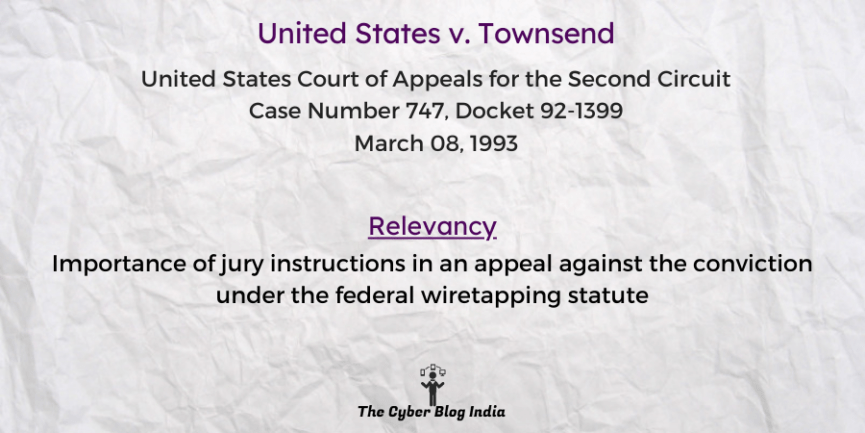United States v. Townsend

United States v. Townsend
987 F.2d 927 : 122 A.L.R.Fed. 825
In the United States Court of Appeals for the Second Circuit
Case Number 747, Docket 92-1399
Before Circuit Judge Kearse, Circuit Judge Winter, and Circuit Judge Altimari
Decided on March 08, 1993
Relevancy of the Case: Importance of jury instructions in an appeal against the conviction under the federal wiretapping statute
Statutes and Provisions Involved
- The Wiretap Act, 18 U.S.C. § 2511
Relevant Facts of the Case
- A former deputy sheriff filed a complaint against the defendant. He alleged that the defendant routinely used automatic recording equipment to capture the telephone conversations of his employees.
- The Vermont District Court convicted the defendant of intentionally intercepting the telephone conversations of third parties without their knowledge or consent.
- The defendant has appealed against his conviction in the present case.
Prominent Arguments by the Counsels
- The defendant-appellant’s counsel contended that the District Court improperly applied a model jury charge adapted from the definition of “knowingly”. The federal wiretapping statute requires the prosecution to prove that the defendant did this act intentionally.
- The appellee’s counsel submitted that the defendant’s act was the product of his conscious objective. It did not happen as a product of a mistake or an accident.
Opinion of the Bench
- The court instructed the jury to find if the defendant acted deliberately, intentionally, and understandingly. This means he knew what he was doing when he intercepted the wire communication.
- The District Court properly instructed the jury on the degree of culpability that the prosecution needed to provide to meet its burden under the statute.
Final Decision
- The court affirmed the District Court’s judgment and upheld the defendant’s conviction.
Satvik Mishra, an undergraduate student at the Rajiv Gandhi National University of Law, Punjab, prepared this case summary during their internship with The Cyber Blog India in May/June 2022.
